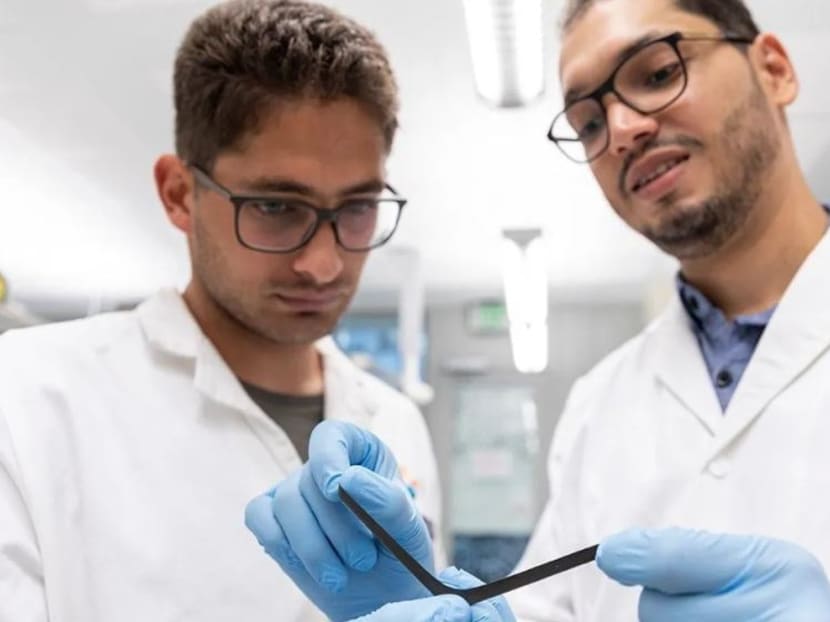This magnetic skin can allow you to open a door with the blink of an eye, researchers say
SAUDI ARABIA — A Saudi research team has developed a ‘magnetic skin’ that can open a door or control a switch remotely with a simple wave of the hand or blink of an eye, as new technology continues to change the way humans interact with the outside world.

PhD students Liam Swanepole (left) and Abdullah Almansouri with the electronic skin.
SAUDI ARABIA — A Saudi research team has developed a ‘magnetic skin’ that can open a door or control a switch remotely with a simple wave of the hand or blink of an eye, as new technology continues to change the way humans interact with the outside world.
The lightweight and flexible skin, combined with magnetic sensors, can be placed on the hand, the fingertip or even the eyelid in any shape or colour, and enables remote control functions, according to scientists at King Abdullah University of Science and Technology (Kaust, who published a study in the journal Advanced Materials Technologies.
The development team said their magnetic skin was “the first of its kind” with wireless sensing.
“Artificial electronic skins typically require a power supply and data storage or a communication network. This involves batteries, wires, electronic chips and antennas and makes the skins inconvenient to wear,” electrical engineer Jurgen Kosel, who led the project, said in a statement. “Our magnetic skin does not require any of this.”
The artificial skin is made with an ultraflexible, biocompatible polymer matrix filled with magnetised microparticles, which is an inexpensive and simple process, says Mr Abdullah Almansour, a PhD student at Kaust involved in the study.
The research team has tested the skin on the eyelid to track eye movement, which could see it potentially applied in human-computer interaction for people with paralysis, or to alert sleepy drivers.
When attached to a finger or weaved into a glove, the magnetic skin enables remote gesture control that can, for example, allow a door to be opened with a wave.
The researchers are also exploring how to apply gesture-control applications of the skin to wheelchair users, and to other areas of contactless human-computer interaction.
Scientists and tech companies continue to push the boundaries of human-machine interaction. Building a brain-computer interface, for instance, is one of the hottest current areas of research.
Mr Elon Musk, chief executive officer of Tesla and SpaceX, is backing start-up Neuralink to develop a device worn behind the ear that can send a user’s thoughts to external devices. Facebook has been testing brain computer interfaces for several years and has developed a skullcap that it says allows users to mentally type their thoughts at 100 words per minute.
Around 150,000 people with the progressive nervous system disorder Parkinson’s disease have benefited from deep-brain stimulation via electrodes that help them control the disease, according to a recent report by The Economist.
Globally, more than 300,000 people have cochlear implants, which enable them to hear by converting sound into electrical signals sent to the brain. SOUTH CHINA MORNING POST






